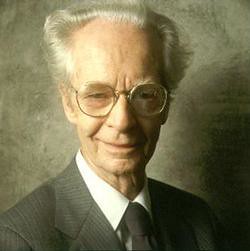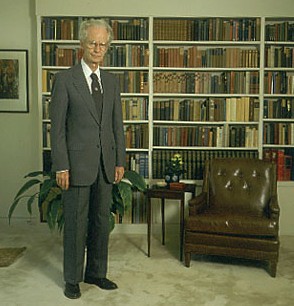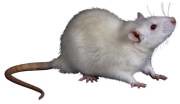B.F. Skinner

B. F. Skinner
(1904 - 1990)
Psychologist
Burrhus Frederic Skinner was born March 20, 1904, in the small Pennsylvania town of Susquehanna. His father was a lawyer, and his mother a strong and intelligent housewife. His upbringing was old-fashioned and hard-working.
Burrhus was an active, out-going boy who loved the outdoors and building things, and actually enjoyed school. His life was not without its tragedies, however. In particular, his brother died at the age of 16 of a cerebral aneurysm.
Burrhus received his BA in English from Hamilton College in upstate New York. He didn’t fit in very well, not enjoying the fraternity parties or the football games. He wrote for school paper, including articles critical of the school, the faculty, and even Phi Beta Kappa! To top it off, he was an atheist -- in a school that required daily chapel attendance.
He wanted to be a writer and did try, sending off poetry and short stories. When he graduated, he built a study in his parents’ attic to concentrate, but it just wasn’t working for him.
Ultimately, he resigned himself to writing newspaper articles on labor problems, and lived for a while in Greenwich Village in New York City as a “bohemian.” After some traveling, he decided to go back to school, this time at Harvard. He got his masters in psychology in 1930 and hisdoctorate in 1931, and stayed there to do research until 1936.
Also in that year, he moved to Minneapolis to teach at the University of Minnesota. There he met and soon married Yvonne Blue. They had two daughters, the second of which became famous as the first infant to be raised in one of Skinner’s inventions, the air crib. Although it was nothing more than a combination crib and playpen with glass sides and air conditioning, it looked too much like keeping a baby in an aquarium to catch on.
In 1945, he became the chairman of the psychology department at Indiana University. In 1948, he was invited to come to Harvard, where he remained for the rest of his life. He was a very active man, doing research and guiding hundreds of doctoral candidates as well as writing many books. While not successful as a writer of fiction and poetry, he became one of our best psychology writers, including the bookW alden II, which is a fictional account of a community run by his behaviorist principles.
alden II, which is a fictional account of a community run by his behaviorist principles.
 alden II, which is a fictional account of a community run by his behaviorist principles.
alden II, which is a fictional account of a community run by his behaviorist principles.
Skinner expressed no interest in understanding the human psyche. He was as strict a behaviorist as John Watson, and he sought only to determine how behavior is caused by external forces. He believedeverything we do are shaped by our experience of punishment and reward. He believed that the "mind" (as opposed to the brain) and other such subjective phenomena were simply matters of language; they didn't really exist. Skinner was known for making audacious statements on this matter (and others), following in Watson's tradition of being provocative, controversial, and an excellent publicist of his ideas.
August 18, 1990, B. F. Skinner died of leukemia after becoming perhaps the most celebrated psychologist since Sigmund Freud.
Theory
B. F. Skinner’s entire system is based on operant conditioning. The organism is in the process of “operating” on the environment, which in ordinary terms means it is bouncing around its world, doing what it does. During this “operating,” the organism encounters a special kind of stimulus, called a reinforcing stimulus, or simply a reinforcer. This special stimulus has the effect of increasing the operant.
B. F. Skinner’s entire system is based on operant conditioning. The organism is in the process of “operating” on the environment, which in ordinary terms means it is bouncing around its world, doing what it does. During this “operating,” the organism encounters a special kind of stimulus, called a reinforcing stimulus, or simply a reinforcer. This special stimulus has the effect of increasing the operant.
The Work of B.F Skinner
Before his death, B.F. Skinner was considered the most influential living psychologist. In the second half of the twentieth century he was the leading advocate for behaviourism.
Before his death, B.F. Skinner was considered the most influential living psychologist. In the second half of the twentieth century he was the leading advocate for behaviourism.
 Rats In Skinner Boxes
Rats In Skinner BoxesSkinner developed an experimental chamber to study learning in laboratory rats. He always called this an operant conditioning chamber, but others refer to it as a Skinner box. (An operant is a voluntary behaviour which a person or animal emits in response to its environment). The chamber included a lever, a metal bar attached to the front wall. Pressing the lever was the response studied in this chamber. Small pieces or pellets of food were presented in a food cup. The floor of the chamber consisted of metal rods through which electric shock could be applied to the feet of the animal.
Skinner performed many experiments with the operant conditioning chamber. He developed operational definitions of reinforcement, punishment, shaping and schedules of reinforcement.
No comments:
Post a Comment